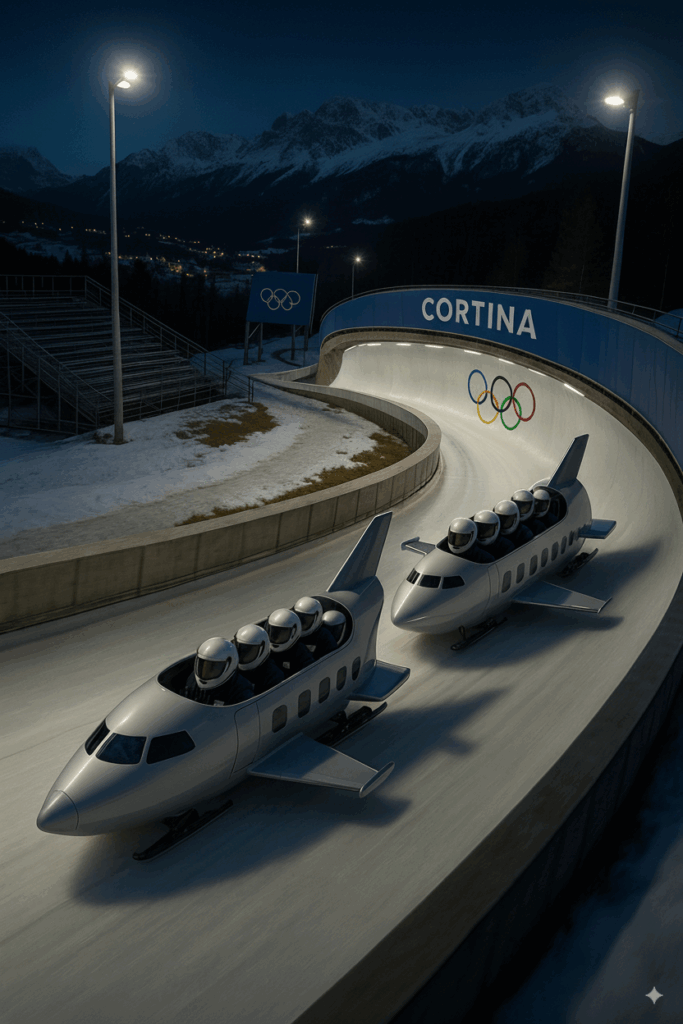2026 Winter Olympics in Milan and Cortina: Business Aviation Planning Guide

The Olympic Winter Games Milano Cortina 2026 will take place from February 6 to 22, 2026, with the Paralympic Winter Games following from March 6 to 15, 2026. This marks a historic moment as they will be the first Olympic Games to officially be co-hosted by multiple cities, with Milan primarily hosting ice events, and the remaining events being hosted in clusters around Cortina, and the Valtellina and Fiemme valleys.
For business aviation operators, this presents both tremendous opportunities and significant operational challenges. With VIPs, corporate delegations, and high-net-worth individuals converging on Northern Italy, advance planning will be critical for successful operations during the Games.
Major Operational Challenges
One of the primary challenges operators will face during the Milano Cortina 2026 Winter Games is managing aircraft parking across northern Italy. With exceptionally high demand from VIPs, corporate delegations, broadcasters, and government flights, available parking at primary airports will be extremely limited.
While Milan Linate (LIML) and Milan Malpensa (LIMC) will function as the primary operational hubs for arrivals and departures, operators should not plan on parking at either airport. Drop-and-go operations with repositioning should be assumed in most cases.
The geographic spread of the Games further compounds the challenge. Events will take place not only in Milan and Cortina d’Ampezzo, but also in Bormio and Livigno (Valtellina), Predazzo and Tesero (Val di Fiemme), Anterselva/Antholz, and Verona. This dispersion increases reliance on regional airports and makes advance coordination essential.
Airport Infrastructure and Preparations
Local authorities are working closely with ENAC, ENAV, and airport operators to manage increased traffic during the Games. Milan remains positioned as the central hub for business aviation activity, supported by dedicated general aviation infrastructure and recent cost adjustments aimed at improving access.
However, parking availability at Milan-area airports will be highly constrained. As a result, regional airports will play a critical role in accommodating repositioning and longer-term aircraft stays. Operators should plan accordingly and avoid relying on Milan airports for extended parking.
Recommended Airport Options
Primary Entry Points
-
Milan Linate (LIML) – Primary hub for passenger arrivals and departures
-
Milan Malpensa (LIMC) – Major international gateway supporting Olympic traffic
Both airports should be treated as operational hubs only, with parking expected to be extremely limited.
Parking and Repositioning Airports
Operators seeking reliable parking or longer-term aircraft stays should prioritize the following airports:
-
LIME – Bergamo
-
New General Aviation Terminal
-
Strong handling capability
-
One of the most reliable parking options in the region
-
-
LIPX – Verona
-
Strategic access to eastern Olympic venues
-
Practical for repositioning and crew logistics
-
-
LIPO – Brescia
-
Very strong alternative with reduced congestion
-
Increasingly favored by operators seeking flexibility
-
-
LIPE – Bologna
-
Larger regional airport with better parking prospects
-
Suitable for longer-term aircraft stays
-
Other regional airports across northern Italy are expected to have very limited capacity, making repositioning a near certainty for most operations.
Premium Helicopter Transfer Services
For passengers interested in premium helicopter transfers directly to Olympic sites, specialized arrangements can be made. These helicopter services provide an exclusive and time-efficient way to reach venues while avoiding ground traffic congestion. Contact Universal Aviation Italy for the best helicopter transfer options tailored to your specific Olympic itinerary.
Critical Planning Requirements
Slot Coordination and Permits
Slot coordination will be mandatory at all major airports throughout both the Olympic and Paralympic periods. Parking approvals will be tightly controlled and subject to change as demand evolves.
Operators should expect:
-
Minimal availability for overnight or extended parking
-
Mandatory repositioning in many cases
-
Tight confirmation windows and evolving local guidance
Early coordination with experienced ground handlers will be essential to securing viable operating plans.
Booking Timeline
Operators should begin planning immediately. Hotel availability for crew will be particularly tight in Milan and Cortina, and ground services are expected to be stretched thin. Early booking is crucial to avoid last-minute complications and ensure service quality.
Lessons from Paris 2024

The Paris Olympics provided valuable insights for operators preparing for Milan 2026:
-
Early slot and parking requests are essential
-
Having backup airport options prevents disruptions
-
Close coordination with local handlers is critical
-
Flexibility and proactive planning are key to avoiding delays
These lessons underscore the importance of beginning preparations well in advance and having contingency plans in place.
Milan’s Unique Advantages
Milan offers a distinctive combination that sets it apart from previous Olympic host cities:
-
Multiple international airports providing operational flexibility
-
Strong existing business aviation infrastructure
-
Proximity to luxury accommodations and venues
-
Dedicated general aviation terminals at both Milan airports
-
Growing network of regional alternatives like Parma
This infrastructure gives operators more options and flexibility compared to many previous Olympic host cities.
Key Takeaways
-
Milano Cortina 2026 will generate exceptionally high business aviation demand
-
LIML and LIMC should be used for arrivals and departures, not parking
-
LIME, LIPX, LIPO, and LIPE should be prioritized for parking and repositioning
-
Repositioning should be assumed during peak Olympic periods
-
Early planning and flexible airport strategies are critical to success
Additional Italy Operations Considerations
Operators should remain aware of ongoing regulatory updates, including Italy’s continuing disinsection requirement for certain flights. Staying informed about regulatory changes and maintaining compliance will be essential throughout the Olympic period.
The combination of Milan’s business aviation infrastructure, the scenic venues in Cortina and the surrounding Alps, and Italy’s world-class hospitality makes the 2026 Winter Olympics an attractive proposition for private aviation clients. However, the key to successful operations will be early planning, flexible alternatives, and close coordination with experienced local partners.
With proper preparation and the right support partners, operators can turn the challenges of Olympic logistics into opportunities to provide exceptional service during one of the world’s premier sporting events.




